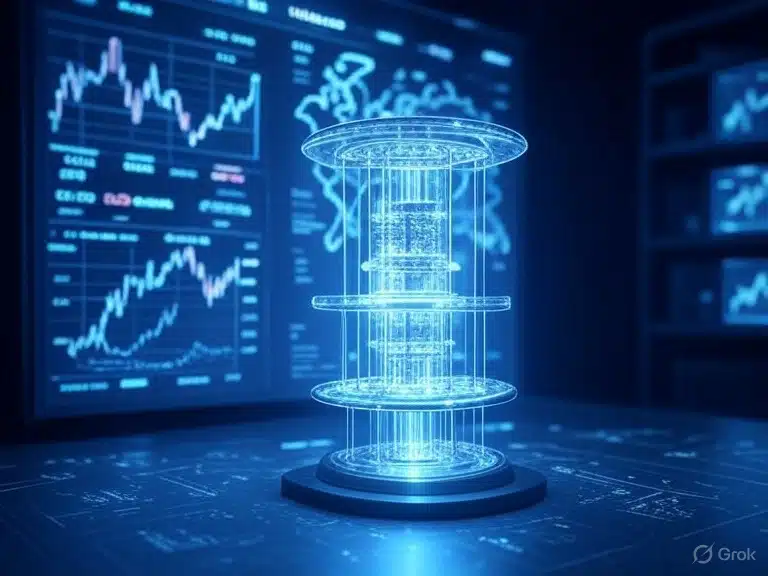The world of finance thrives on numbers, algorithms, and speed. Today’s financial systems already depend heavily on supercomputers, AI, and blockchain to process billions of transactions every second. But what if we took it one step further? What if quantum computers—machines capable of solving problems far beyond classical computing—took control of global finance?
This scenario would reshape banking, trading, cybersecurity, and even global economics. Let’s explore the potential benefits, risks, and future of a quantum-powered financial world.
What Makes Quantum Computers Different?
Traditional computers use bits—zeros and ones—to process data. Quantum computers use qubits, which can exist as 0, 1, or both simultaneously (a phenomenon called superposition). Combined with entanglement, quantum machines can perform calculations at speeds impossible for classical systems.
In finance, where fractions of a second can mean billions of rupees gained or lost, quantum computing could become the ultimate weapon.
Benefits of Quantum-Controlled Finance
1. Ultra-Fast Trading
Quantum computers could analyze massive market datasets in real time, predicting price shifts and executing trades before human traders even notice patterns. High-frequency trading would become quantum trading, operating at unimaginable speed.
2. Fraud Detection and Security
Financial fraud, identity theft, and insider trading could decline sharply. Quantum systems could monitor global transaction flows, instantly spotting anomalies that suggest criminal activity.
3. Risk Management at a New Level
Banks struggle with predicting crises due to the complexity of global markets. Quantum computers could simulate thousands of market scenarios simultaneously, allowing governments and corporations to predict financial crashes before they happen.
4. Smarter Investments
Quantum-powered AI could advise investors with pinpoint accuracy, optimizing portfolios and even reducing market volatility. This could make finance more efficient and profitable for both individuals and corporations.

The Dark Side: Risks of Quantum Finance
1. Broken Encryption
Quantum computers could crack today’s encryption systems within seconds. Banking systems, credit cards, and cryptocurrency wallets would all be vulnerable. Without quantum-resistant cryptography, global finance could collapse overnight.
2. Financial Inequality
Nations or corporations with access to quantum finance would gain unprecedented power, leaving others far behind. The global economic gap could widen dramatically.
3. Market Manipulation
If one group controlled quantum trading, they could dominate global stock exchanges, influencing economies, governments, and even geopolitical power. This could create a financial dictatorship.
4. Systemic Instability
Quantum computers are powerful but also unpredictable. A single miscalculation could trigger chain reactions across markets, wiping out trillions in wealth within seconds.
Impact on Global Institutions
Central Banks
Institutions like the U.S. Federal Reserve or the Reserve Bank of India would rely on quantum simulations to set interest rates, predict inflation, and stabilize currencies. Monetary policies could become hyper-precise—but also dangerously over-optimized.
Cryptocurrencies
Bitcoin and other cryptocurrencies depend on encryption. A quantum-controlled system could break blockchain security, making most cryptocurrencies obsolete unless they evolve with quantum-safe cryptography.
Stock Markets
Stock exchanges would shift from milliseconds to quantum-time trading. Human traders would no longer compete—markets could become almost fully automated, with algorithms running on quantum logic.
International Trade
Quantum systems could balance global trade flows instantly, removing inefficiencies. However, this level of optimization could also reduce human control over global supply chains.

Could Quantum Finance Be Regulated?
Regulating traditional finance is already a challenge. With quantum computing, the complexity increases a hundredfold. Governments would need global agreements, quantum watchdog organizations, and strict AI oversight to ensure fair play.
Possible safeguards might include:
- Quantum firewalls to prevent hacking.
- Transparent algorithms for accountability.
- Quantum auditing systems monitoring real-time transactions.
Without strict oversight, quantum finance could spiral out of control, leaving ordinary people powerless against unseen algorithms.
The Future: Merging Quantum and Human Decision-Making
While it’s tempting to imagine a fully quantum-controlled financial system, the likely future will be hybrid. Quantum computers will handle simulations, predictions, and security, while human policymakers make ethical and strategic decisions.
This balance could offer the best of both worlds: the speed of quantum technology with the values and accountability of human governance.
Conclusion
If quantum computers controlled global finance, humanity would enter a new economic era. Trading would become faster, fraud detection sharper, and risk management more precise. But the dangers—broken encryption, inequality, and market instability—could destabilize entire nations.
The future of finance may well depend on how wisely humanity integrates quantum technology. Used responsibly, it could bring stability and prosperity. Misused, it could plunge the world into chaos at quantum speed.

